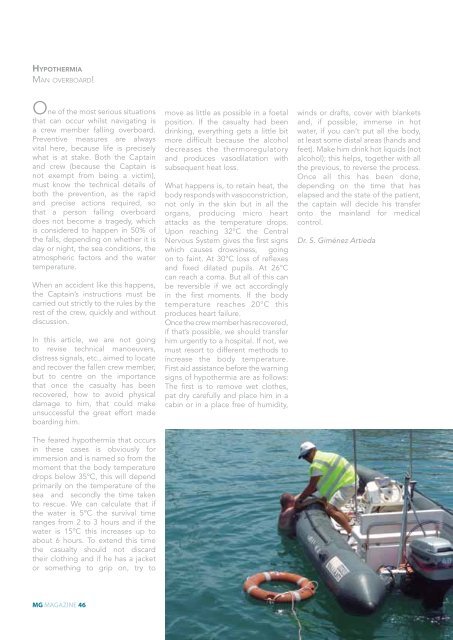Avistamiento de delfines en Altea COLABORACIÓN ESPECIAL
Avistamiento de delfines en Altea COLABORACIÓN ESPECIAL
Avistamiento de delfines en Altea COLABORACIÓN ESPECIAL
Create successful ePaper yourself
Turn your PDF publications into a flip-book with our unique Google optimized e-Paper software.
hyPotherMia<br />
MAn OvERbOARd!<br />
One of the most serious situations<br />
that can occur whilst navigating is<br />
a crew member falling overboard.<br />
Prev<strong>en</strong>tive measures are always<br />
vital here, because life is precisely<br />
what is at stake. Both the Captain<br />
and crew (because the Captain is<br />
not exempt from being a victim),<br />
must know the technical <strong>de</strong>tails of<br />
both the prev<strong>en</strong>tion, as the rapid<br />
and precise actions required, so<br />
that a person falling overboard<br />
does not become a tragedy, which<br />
is consi<strong>de</strong>red to happ<strong>en</strong> in 50% of<br />
the falls, <strong>de</strong>p<strong>en</strong>ding on whether it is<br />
day or night, the sea conditions, the<br />
atmospheric factors and the water<br />
temperature.<br />
Wh<strong>en</strong> an acci<strong>de</strong>nt like this happ<strong>en</strong>s,<br />
the Captain’s instructions must be<br />
carried out strictly to the rules by the<br />
rest of the crew, quickly and without<br />
discussion.<br />
In this article, we are not going<br />
to revise technical manoeuvers,<br />
distress signals, etc., aimed to locate<br />
and recover the fall<strong>en</strong> crew member,<br />
but to c<strong>en</strong>tre on the importance<br />
that once the casualty has be<strong>en</strong><br />
recovered, how to avoid physical<br />
damage to him, that could make<br />
unsuccessful the great effort ma<strong>de</strong><br />
boarding him.<br />
The feared hypothermia that occurs<br />
in these cases is obviously for<br />
immersion and is named so from the<br />
mom<strong>en</strong>t that the body temperature<br />
drops below 35ºC, this will <strong>de</strong>p<strong>en</strong>d<br />
primarily on the temperature of the<br />
sea and secondly the time tak<strong>en</strong><br />
to rescue. We can calculate that if<br />
the water is 5ºC the survival time<br />
ranges from 2 to 3 hours and if the<br />
water is 15ºC this increases up to<br />
about 6 hours. To ext<strong>en</strong>d this time<br />
the casualty should not discard<br />
their clothing and if he has a jacket<br />
or something to grip on, try to<br />
MG Magazine 46<br />
move as little as possible in a foetal<br />
position. If the casualty had be<strong>en</strong><br />
drinking, everything gets a little bit<br />
more difficult because the alcohol<br />
<strong>de</strong>creases the thermoregulatory<br />
and produces vasodilatation with<br />
subsequ<strong>en</strong>t heat loss.<br />
What happ<strong>en</strong>s is, to retain heat, the<br />
body responds with vasoconstriction,<br />
not only in the skin but in all the<br />
organs, producing micro heart<br />
attacks as the temperature drops.<br />
Upon reaching 32°C the C<strong>en</strong>tral<br />
Nervous System gives the first signs<br />
which causes drowsiness, going<br />
on to faint. At 30°C loss of reflexes<br />
and fixed dilated pupils. At 26°C<br />
can reach a coma. But all of this can<br />
be reversible if we act accordingly<br />
in the first mom<strong>en</strong>ts. If the body<br />
temperature reaches 20°C this<br />
produces heart failure.<br />
Once the crew member has recovered,<br />
if that’s possible, we should transfer<br />
him urg<strong>en</strong>tly to a hospital. If not, we<br />
must resort to differ<strong>en</strong>t methods to<br />
increase the body temperature.<br />
First aid assistance before the warning<br />
signs of hypothermia are as follows:<br />
The first is to remove wet clothes,<br />
pat dry carefully and place him in a<br />
cabin or in a place free of humidity,<br />
winds or drafts, cover with blankets<br />
and, if possible, immerse in hot<br />
water, if you can’t put all the body,<br />
at least some distal areas (hands and<br />
feet). Make him drink hot liquids (not<br />
alcohol); this helps, together with all<br />
the previous, to reverse the process.<br />
Once all this has be<strong>en</strong> done,<br />
<strong>de</strong>p<strong>en</strong>ding on the time that has<br />
elapsed and the state of the pati<strong>en</strong>t,<br />
the captain will <strong>de</strong>ci<strong>de</strong> his transfer<br />
onto the mainland for medical<br />
control.<br />
Dr. S. Giménez Artieda


